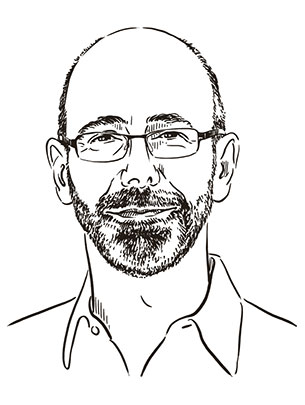“Different people make different decisions.”
Interview: Christoph Dieffenbacher
Research into human decision-making brings together the fields of psychology and economics. One of the first researchers to study this topic intensively at the University of Basel is Professor Jörg Rieskamp.
UNI NOVA: Professor Rieskamp, it is said that an adult human has to make tens of thousands of decisions every day. Why do we still know so little about this field?
JÖRG RIESKAMP: Although the psychology of decision-making is a relatively new area of science, we’ve now moved beyond the very early stages – and researchers have already presented a number of insights. For example, decision-making research received particular attention around 20 years ago when two researchers from the USA, Daniel Kahneman, a psychologist, and Vernon L. Smith, an economist, were awarded the Nobel Prize in Economics in recognition of their work. Our research involves a constant interplay with economics, whose theories often postulate a rational individual. Yet instead of normativity, we psychologists are more interested in the basic cognitive processes that underly judgments and decisions …
UNI NOVA: … and, in doing so, you draw a distinction from the concept of homo economicus, which is guided by the greatest economic benefit?
RIESKAMP: Yes, that’s the point. An individual’s decisions depend on many factors, including the situation and context, and these factors can have different effects on different people. For example, we’ve shown that certain personality traits have a profound impact on decisions, and these traits tend to remain relatively stable over an entire lifetime – for instance, people differ in terms of what is known as their risk preference: Most people are risk-averse, but there are also people who enjoy taking risks. At the same time, our duties and demands vary over the course of our lives, and the decisions we make will be more or less risky depending on the situation. Key factors in this include a person’s age and the corresponding resources at their disposal.
UNI NOVA: In this type of research, the fields of economics and psychology work hand in hand with one another. Is the latter supposed to help the former keep the economic system running as a whole?
RIESKAMP: I wouldn’t say it’s supposed to help. As psychologists, we focus our attention elsewhere – our aim is to explain how people make decisions. If our descriptions of human behavior yield different results from those of the economists, then these findings can aid the development of more realistic economic models. At the University of Basel, one example of this relationship is our Bernoulli Network, which focuses on the interplay between psychology and economics.
UNI NOVA: When people become customers and investors: How close is the relationship between economics and psychology in decision research?
RIESKAMP: There are a number of key differences: In many individual decisions, the potential consequences are not entirely certain – or, as we psychologists would say, decisions are made in circumstances of uncertainty and risk. In the context of consumer behavior, we often neglect this uncertainty: When choosing a detergent in the supermarket, we assume that the price is fixed and won’t be changed at the checkout. Quite the opposite is true when it comes to decisions to invest in retirement plans, for example. Investing in shares doesn’t necessarily produce a high yield, especially when viewed in the short term. Here, it’s important to account for people’s different risk preferences and gauge their risk tolerance. In the aftermath of the last financial crisis, banks were even obliged to provide customers with more-detailed information about the available products and the levels of risk they carry.
UNI NOVA: We make decisions with uncertain consequences on a daily basis. Is a decision therefore a choice between two different risks?
RIESKAMP: Yes, and this is clear when it comes to questions of health. For example, many people initially struggled to evaluate and assess the risk associated with the coronavirus, which is obviously partly due to the rapidly changing circumstances. And, when choosing a mode of transport, many people are unaware of the considerable differences in risk – that is, how dangerous riding a motorcycle is compared to driving a car and, by contrast, how safe you actually are on an airplane, statistically speaking. People assess specific risks and hazards differently and not always accurately. The risk of new and frightening hazards is often overestimated, while we underestimate the risk associated with hazards we’ve been dealing with for a long time and are familiar with. At the same time, the subjective perception of a risk often fails to reflect the objective danger.
UNI NOVA: Would it be wrong to conclude that humans are not particularly good at estimating risk and probability?
RIESKAMP: Well, probability theory is a branch of mathematics, which many people aren’t particularly good at. In new situations, therefore, people often struggle to make specific and accurate estimates of probability. On the other hand, if someone has a lot of experience in an area and is considered an expert, their estimates can be very accurate. For example, meteorologists are very good at dealing with statements of probability in weather forecasts. Communicating and improving the understanding of probabilities, however, calls for a more accurate explanation of the reference class – the class of events or objects to which the probability refers.
UNI NOVA: Do you see yourself more as a basic or an application-oriented researcher?
RIESKAMP: Both. By examining the cognitive processes that underly a variety of different decisions in humans, we are clearly acting as basic researchers. But the beautiful thing about this branch of science is that by explaining decisions, we can also quickly establish their practical relevance and their link to real-world applications. For example, a person who is very risk-averse in their general behavior should be advised against investing their entire fortune in shares on a short-term basis.
More articles in the current issue of UNI NOVA.

